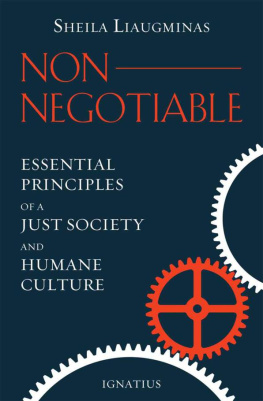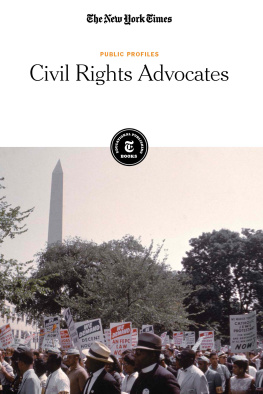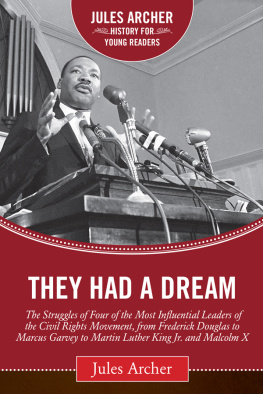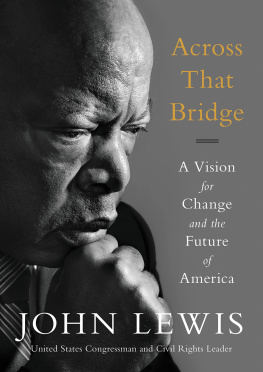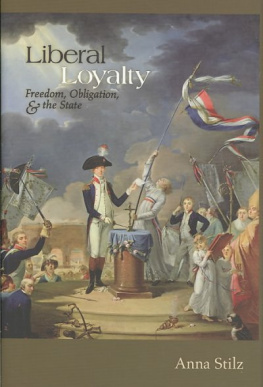NON-NEGOTIABLE
SHEILA LIAUGMINAS
Non-Negotiable
Essential Principles of a Just Society
and Humane Culture
IGNATIUS PRESS SAN FRANCISCO
Cover design by Milo Persic
2014 by Ignatius Press, San Francisco
All rights reserved
ISBN 978-1-58617-794-2
Library of Congress Control Number 2013909316
Printed in the United States of America
Dedicated to
Fr. Andrew Liaugminas
CONTENTS
The Manhattan Declaration
Peace on Earth, Order in the Universe
Who Decides?
The Gosnell Trial: Murders in an Abortion Clinic
The Slavery / Abortion Analogy
The Right. That Precedes All Other Rights
Priority of Issues
Principle and Policy
A Voice for the Voiceless
Life Unworthy of Life
Patients Rights / Human Rights
Embryonic Stem Cell Research and Cloning
Moral Obligations at the End of Life
Social Consequences of Same-Sex Marriage
The Nature of Marriage Preexists Church or State
Pope Benedicts Concerns for Marriage and Family
Persons and Acts
The Defiance of Faith
First among Freedoms
Conscience Rights and Natural Law
Clearly Defining Terms
The Church as Bulwark
What Must. We Do?
A Strong Witness
Onward
PREFACE
We the people are losing our ability to think clearly or reason well. We are largely unable to have civil discourse and have virtually lost the art of argument. We no longer even have a common language with the moral grammar of our Founders, the grammar of ethics that formed the Judeo-Christian tradition which shaped and directed our nation. Religiously informed voices and politically motivated ones are talking past each other, apparently without realizing their mutual source and goal. In other words, the ideals of modern democracy are Christian in origin, and they form the pillars required to hold up a flourishing society.
The characteristically Christian element of our nation is its foundation upon the inalienable dignity of the human person . The human person is the pinnacle of Gods handiwork God so loved this human creature that he sent his own Son to become one among its numberand not only that, but to give the ultimate sacrifice for human salvation. That was how much God loved humanity. And not just humanity in a vague, amorphous sense, but each and every human personespecially the smallest, the least, and the forgotten. No matter what state they are in, people have dignity and deserve to be treated accordingly. Period.
Of course, it takes a lot to live this out in practice. Far too easy it is to be like the character Pierrot in Edna St. Vincent Millays play Aria da Capo (1920) and see no incongruity in saying: I love Humanity; but I hate people! But it is real flesh and blood people, you and I, who make up humanity. So does the child in the womb, the person in the gutter, and the patient relying upon medical nutrition and hydration for life When it comes to us humans, certain truths are so foundational for our life and flourishing that they are simply not open to debate or mitigationthey are non-negotiable .
INTRODUCTION
One of the most important human values is doubtlessly the right to life, to be protected from the moment of conception up to the moment of natural death. However, it must be considered a serious paradox that this right to life is threatened precisely by todays highly advanced technology. Such a paradox has reached the extent of creating a culture of death, in which abortion, euthanasia, and genetic experiments on human life itself have already obtained or are on the way to obtaining legal recognition. How can we not make a correlation between this culture of death in which the most innocent, defenceless, and critically ill human lives are threatened with death, and terrorist attacks, such as those of 11 September, in which thousands of innocent people were slaughtered? We must say that both of these are built on contempt for human life .Francis Cardinal Arinze The propitious smiles of Heaven can never be expected on a nation that disregards the eternal rules of order and right which Heaven itself has ordained .George Washington
Over a year into the American Civil War, President Abraham Lincoln had an epiphany on an issue that had nagged him to that point, something he had tried to reckon with in different ways, but he had been frustrated at each turn. Slavery, he came to realize, was not an issue tied up with other issues in the contentious debate and rhetoric dividing the nation. Slavery was at the heart of the rebellion, and it was a moral issue more than a military or political one. Dedicated to eliminating it finally, Lincoln delivered the Emancipation Proclamation to his cabinet and pushed past opposition on both sides in order to make emancipation and racial equality a central war effort by the beginning of 1863. Near the end of that year, his Gettysburg Address was dedicated to the equality of all people as a foundational issue for a moral union of states.
But he had to do more before the Civil War ended to eliminate the risk that slavery would be reinstated. Lincoln dedicated himself to securing emancipation once and for all through ratification of the Thirteenth Amendment, abolishing slavery. It was early 1865, and factions of Republicans and Democrats with different political goals justified pushing back on slavery for other issues they each considered more important. For Lincoln, nothing was more important, and this was not something he could not secure. In other words, it was for him not negotiable. In spite of politics, and through dedication to a singular principle of human dignity and equality, he secured just enough votes to get it done.
A few months later, in a meeting with former U.S. Supreme Court Justice John Campbell at the Confederate White House, Lincoln listed three non-negotiable presidential demands: restoration of federal authority in the South; no retreat from his commitment to former slaves; and unconditional surrender of Confederate troops.
He never wavered in his dedication to the principle of human dignity and equality as the core of a just nation Lincoln would never retreat from his pledge to keep slavery contained; indeed, his insistence on the gradual extinction of slavery was a non-negotiable element in his Unionism.
* * *
How does a nation, or any large community of peoples, determine what is true, right, and good in structuring its governing documents? To what authority do drafters of those guiding principles refer, and to what end?
The Declaration of Independence appealed to the Laws of Nature and of Natures God in its opening statement, to assume among the powers of the earth, the separate and equal station to which God entitles them. The very next line claims and orders that entitlement: We hold these truths to be self-evident, that all men are created equal, that they are endowed by their Creator with certain unalienable Rights, that among these are Life, Liberty and the pursuit of Happiness.
The United Nations Universal Declaration of Human Rights was drafted by the Commission on Human Rights, which included the prominent French Catholic philosopher Jacques Maritain. It opens with this Preamble:
Whereas recognition of the inherent dignity and of the equal and inalienable rights of all members of the human family is the foundation of freedom, justice and peace in the world,Whereas disregard and contempt for human rights have resulted in barbarous acts which have outraged the conscience of mankind, and the advent of a world in which human beings shall enjoy freedom of speech and belief and freedom from fear and want has been proclaimed as the highest aspiration of the common people,...Whereas the peoples of the United Nations have in the Charter reaffirmed their faith in fundamental human rights, in the dignity and worth of the human person and in the equal rights of men and women and have determined to promote social progress and better standards of life in larger freedom,Whereas Member States have pledged themselves to achieve, in cooperation with the United Nations, the promotion of universal respect for and observance of human rights and fundamental freedoms,Whereas a common understanding of these rights and freedoms is of the greatest importance for the full realization of this pledge,Now, Therefore the general assembly proclaims THIS UNIVERSAL DECLARATION OF HUMAN RIGHTS as a common standard of achievement for all peoples and all nations, to the end that every individual and every organ of society, keeping this Declaration constantly in mind, shall strive by teaching and education to promote respect for these rights and freedoms and by progressive measures, national and international, to secure their universal and effective recognition and observance, both among the peoples of Member States themselves and among the peoples of territories under their jurisdiction.
Next page
